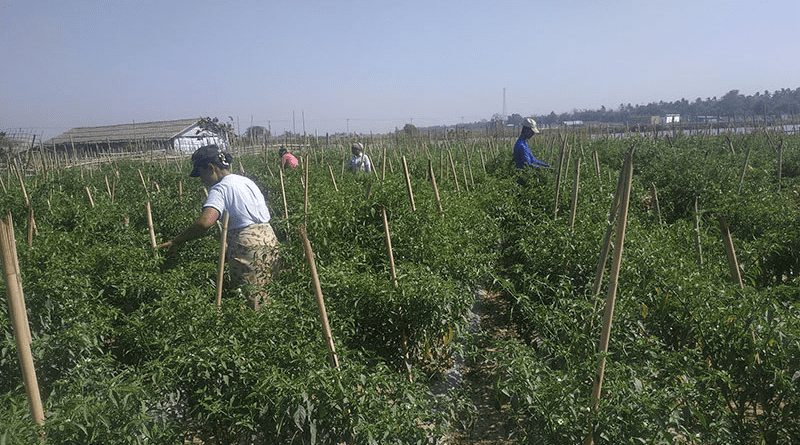Myanmar: AA, Business Owners Call For Self-Sufficiency In Wake Of Ceasefire
By DMG
The Arakan Army (AA) and local business owners have stressed the importance of self-sufficiency to avoid food shortages and high food prices.
When asked by a reporter about food shortages and high food prices caused by ongoing junta blockades of the Sittwe-Ponnagyun road during a press conference held by the AA on Monday, AA spokesman U Khaing Thukha said: “Regarding export and import, rather than relying solely on one side, we should think about opening trade routes with various sides in the future. And we must also grow and manufacture for self-sufficiency. And I would like to inform you that the ULA government is taking measures to implement those projects.”
The Myanmar military and the AA have observed an informal ceasefire since November 26, but the two most widely used roads — the Ponnagyun-Sittwe and Rathedaung-Ponnagyun roads — remain blocked off, with local people still experiencing inconveniences.
The AA says it is taking measures to resolve difficulties for the people. “We will soon notify the people about what we are doing,” said U Khaing Thukha.
Amid the renewed military tensions with the AA, the Myanmar military blockaded many roads and waterways in Buthidaung, Maungdaw, Rathedaung and Pauktaw townships, as well as the Sittwe-Ponnagyun road section of the Yangon-Sittwe road.
Locals faced food shortages and high prices as a result. Prominent businessman U Khin Maung Gyi from Arakan State said Arakan State suffers badly from junta blockades because the state barely grows and manufactures on its own.
“There are no business owners who can create value-added products from agricultural produce, manufacturing plants and fishery products. Arakan State has always relied on others for food and other products. Only when this situation, like a revolution, will we be able to recover. Arakan people have now learned a lesson from the blockade,” he said.
As fewer people engage in the agricultural industry in Arakan State, the majority hardly operate on a commercial scale because of the lack of technology and capital available. And Arakan residents mainly purchase from Yangon and other parts of the country, said local businessmen.
While there are more than 1.2 million acres of farms in Arakan State, only 540,000 acres of farms have been placed under cultivation in the current cold season, according to the Arakan Farmers Union.
Aubergine, potato, pepper, cucumber, peanut, mustard, watermelon, cabbage, and mung beans are mainly grown as cold season crops in Ponnagyun, Kyauktaw, Mrauk-U and Minbya townships. The demand for cold season crops that were grown amid the high costs of agricultural inputs, is declining due to travel restrictions, said a farmer from Mrauk-U.
“The demand is low compared with previous years. In previous years, vehicles from Rathedaung and Ponnagyun townships came directly to here, and there was high demand for vegetables. But vehicles can’t come this year, and the prices of vegetables have declined due to low demand,” he said.
More farmers are giving up farming as a result. The lesser sown acreage means a decline in output, and Arakan State farmers have had to raise prices for vegetables and fruits brought in from Yangon and other parts of the country.

